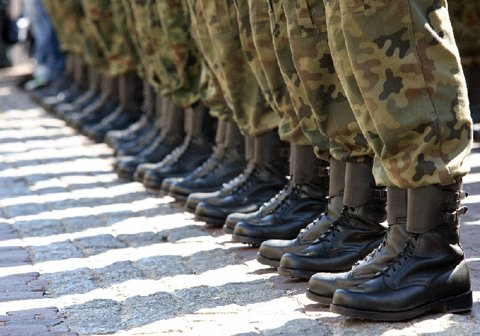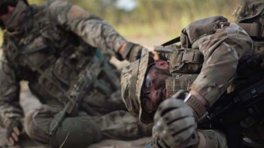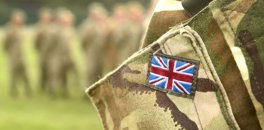
Gavin Hughes
Partner, Military Claims Solicitor
Our Military Claims Solicitors can help you claim compensation if you’ve been injured in a military training accident, or if you’ve lost a loved one whilst they were training in the British Armed Forces.
It can be a daunting prospect to make a claim against the MoD. Having experts by your side makes the process much easier. Although you may be nervous, it is important to be aware that strict rules preventing discrimination against service personnel who make compensation claims apply. Settlement awards also come out of a separate budget, and therefore your unit will not be impacted by your compensation claim.
We offer free, initial expert legal advice to serving Armed Forces personnel, veterans and family members to discuss potential compensation claims. If we take your case on, we will deal with this on a No Win, No Fee basis.
We have an excellent track record of securing compensation for our armed forces clients. You can be confident that we’ll handle your claim compassionately, expertly, and get you the compensation you are entitled to.
You don’t need to worry about finding money to pay for your claim because if we can help you, we’ll offer you a No Win, No Fee agreement so you will not pay any legal costs if you lose your claim.
For a free initial claims assessment, get in touch with our Military Claims Solicitors today.
Fill in the form below to get in touch with one of our dedicated team members, or call our team today on: 0800 260 5010
If you’re serving in the British Armed Forces or are a veteran, you could make a claim for compensation if you have been injured in the course of your military career.
The MOD have a duty to take reasonable steps to make sure that all Armed Forces personnel are safe whilst in training, and on operational duties. If you’ve been involved in an accident in the course of your duties, you could claim compensation.
You could also make a claim if your Chain of Command or Forces Medical Officers fail to manage any physical or psychiatric injuries you sustain in service, leading to an aggravation of a pre-existing injury. If the Chain of Command or Medical Officers have not managed your condition to a reasonable standard, you may be entitled to make a claim.
We can help you claim for:
We know you’re likely to be nervous about bringing a compensation claim against the MoD. You may even feel that they’ll think you’re just after money. But as employers, they understand that compensation claims are about more than getting funds. We may be able to put together a rehabilitation plan and negotiate interim payments if the MoD admits liability early on in the claim. Bringing a claim can also clarify how the negligence happened. This can encourage changes to be made so no one else suffers the same injury that has affected you.
A typical military negligence claim runs as follows:
If you’ve been injured or suffered an illness when serving in the British Armed Forces, you can make an AFCS claim. Your job is already dangerous, so it’s important that you can get the help you need if you become ill or injured.
The AFCS is a no-fault scheme, so the payment awarded does not depend on proving blame. Instead, you just need to show that you suffered an injury while in service, including combat and conflict situations.
As long as your accident or illness happened on or after 6 April 2005 and you submit your claim before the seven year deadline, you can make an AFCS claim.
The AFCS is a Government scheme run by Veterans UK. There are two main types of AFCS awards:
A military injury compensation claim involves making a claim against the MoD. Unlike an AFCS claim, in a military injury compensation claim, you must prove, on the balance of probabilities, that the MoD was negligent, and this caused you to suffer an injury.




Yes, and you cannot be discriminated against for making a claim. We know how uncomfortable you may feel about bringing a claim, but it’s important to know that compensation awards are paid out of a separate budget, so will not impact your unit.
We’ll support and guide you through every step of the claims process, and you can be confident we’ll protect your relationship with your employer whilst advocating robustly for compensation.
Absolutely not. The MoD understands that you’re working in a job that sometimes involves considerable risk and danger. All employers, including the MoD, know employees that suffer an injury due to negligence often must make a compensation claim to pay for rehabilitation, treatment, and lost earnings. You have a right to be compensated.
No, your pension will not be negatively affected if you make a military negligence compensation claim.
Military accidents and injuries can result in you having to pay for many additional expenses Compensation can help you fund:
If we’re able to offer you a No Win, No Fee Agreement (also known as a Conditional Fee Agreement) and organise After The Event Insurance, you will not have to pay anything if you lose your claim. If you win, the MoD will pay a proportion of our legal costs, but you may have to pay for some of these yourself out of your compensation award. You will also have to pay a ‘success fee’. The amount will be capped at a percentage agreed in advance and cannot be more than 25%.
Our Military Claims Solicitors are compassionate, sensitive, knowledgeable, and experts in negotiation and bringing compensation claims in court. You can be confident that we’ll support you and your family during the claims process and work tirelessly to get you the compensation you need to move forward towards a positive future.
Yes, we offer No Win, No Fee. This means if you lose your claim, you will not have to pay any legal fees. We can also arrange After The Event Insurance, so you’re covered against having to pay any expenses related to your case and the other side’s costs if your claim is unsuccessful. We take on all the financial risk so you can concentrate on your recovery.

There is a time limit for making a personal injury claim. This is usually three years from the date of the accident or injury, or three years from when you first became aware of your condition. This is called the date of knowledge.
Witness evidence is crucial in military accident and injury claims, so it’s important to get this evidence as soon as possible whilst witnesses have a clear memory of the accident or event.
Military negligence compensation awards are split into two categories:
The Armed Forces Compensation Scheme offers a tax-free lump sum of between £1,236 and £650,000 depending on how badly you have been injured. You may also be awarded a monthly guaranteed income payment.
Civil military injury compensation claims typically result in higher awards. The amount you’ll get will depend on the type of injury you received and your long-term prognosis.
It depends on the extent of your injuries and whether the MoD admits liability early on in the claim. Claims normally take between 12 and 36 months to settle.
A claim can be made through the Armed Forces Compensation Scheme or the civil courts. Our friendly and compassionate Solicitors will help you make a claim and support you through the process.

Our client was diagnosed with a non freezing cold injury in his hands and feet, after an assessment at the Institute of Naval Medicine in Gosport. Learn how we were able to help him

Our Military Claims Solicitors helped a former British armed forces serviceman get £400,000 compensation after he was diagnosed with a Non Freezing Cold Injury in his hands and feet.

Soldier’s Deployment on 10-Day Tour Hampered Recovery from Back Injury- While on an Army tour in Afghanistan, our client Mr P came under fire and tried to climb down from the turret of his armoured vehicle at speed.
Combat immunity means that military personnel cannot generally claim for negligence or injury that happens during combat. But you can claim compensation for an injury caused during non-combat training, exercises, or deployment, even if your injury happened overseas.
There are exceptions to combat immunity. These cases are often complicated. Our Military Claims Compensation Solicitors have the expertise and experience to handle these types of claims, and we have a robust reputation for success.
You can also bring a claim under the Armed Forces Compensation Scheme even if the injury occurred during combat.
We’ll gather evidence from various sources to support your claim, including (but not limited to):
Depending on the seriousness of your injury and how quickly the MoD admits liability, your claim could take anything from 12 to 36 months to resolve.
If your claim is unsuccessful through no fault of your own you will not be charged under our no win, no fee agreement and the protection offered by the After the Event insurance.
Yes, you can change Solicitors at any time during the claims process. We will advise you how to do this and ask your former Solicitors for all the information relating to the claim which they must hand over.
No, your pension will not be affected by your claim.
Because we offer No Win, No Fee, there are no upfront costs when making a military compensation claim.
To start the claims process, either through the Armed Forces Compensation Scheme or a civil military negligence claim, speak to our expert team. We’ll arrange a free initial consultation were we’ll carefully listen to what happened to you and see if we can help. You’ll also find out about how No Win, No Fee works, and depending on how complex your claim is, how much compensation you could expect to receive.
It depends on the circumstances. In most cases, you must make a claim with three years of the injury occurring or the date which you became aware of the injury. If the injury happened before you turned 18 years, you have three years from your 18th birthday to make a claim.
If the injury resulted in you losing mental capacity, the three year time limit does not apply. But if you regain mental capacity, the three year clock will start from the date this occurred.
If the injured person passed away during the three year period then the three years starts again for date of passing.
If the claim is being brought only under the Armed Forces Compensation Scheme then the time limit is seven years.
If the claim relates to bullying and harassment you may have up to six years to bring your claim.
Despite these time limits we would suggest that you seek expert advice as soon as possible to allow your claim to be fully investigated and brought in time.
If the MoD denies your claim, we’ll use the evidence we’ve gathered, including expert medical evidence, to prove it breached its duty of care to you and this breach caused your injury.
Everyone at Simpson Millar is dedicated to providing all the help and support our clients need throughout the claims process. Not only will we manage your claim, but we’ll also put you in contact with support services if you wish to access further help. If the MoD admits liability early, we may be able to assist with getting a treatment programme and rehabilitation plan in place.
Our Solicitors must follow data protection rules. Article 9(1) of the UK General Data Protection Regulations covers the use of special categories of data, including medical and health information. It states your medical data can only be processed with your full consent or because it must be revealed in a legal claim.
Your personal information may also be sensitive due to your military role. If you have any concerns about the use of your personal information, you can talk to us, and we’ll do everything possible to ease your worries.
It is not unusual for the MoD to refuse to admit liability. It’s our job to gather the evidence to prove that its negligence caused your injury. You can trust us to act firmly and decisively and prove that you are entitled to compensation.
Yes, you can. A civil claim may be a better option for you, and this is something we can talk about in your free claims assessment. Civil claim compensation is usually higher than an AFCS award.
You can’t be compensated twice for an injury or illness, so any award from AFCS will be credited against your civil claim compensation payment.
If you are contacted by the MoD about your claim, it is best to refer them to us and we’ll handle the matter. This allows your claim to be separate from your day-to-day professional life.

It’s been widely reported that a military officer with 26 years of service was the victim of derogatory and insulting remarks during a consultation with a civilian panel advising the Ministry of Defence on his Armed Forces Compensation Scheme (AFCS) claim.

Back in 2014, the Ministry of Defence (MoD) signed a contract with US defence contractor General Dynamics to design, build and test 589 fully-digitised, armoured Ajax land vehicles. Learn More

We helped a woman who was medically discharged from the Army claim compensation for medical negligence, after a surgeon’s medical recommendations had been ignored many years earlier. Learn how we were able to help
Fill in the form below to get in touch with one of our dedicated team members, or call our team today on: 0800 260 5010